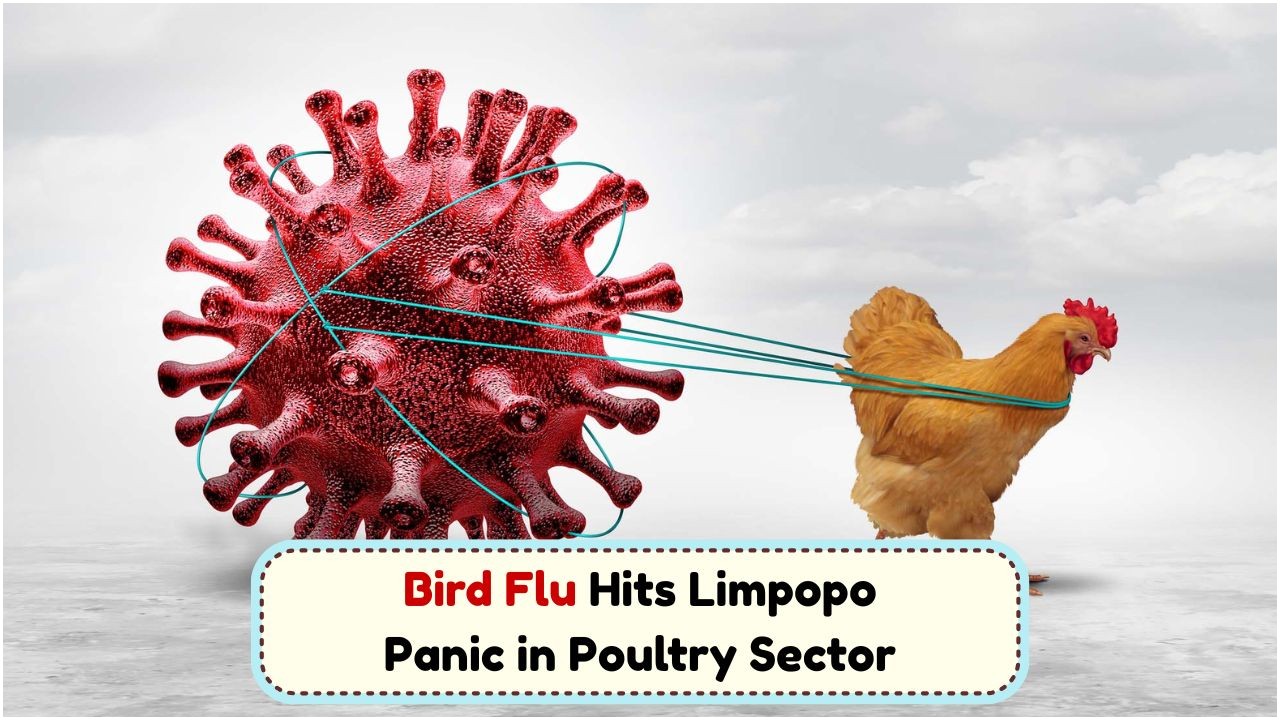Limpopo Bird Flu Crisis: The recent outbreak of bird flu in Limpopo has sent shockwaves through the region, prompting the government to issue a red alert across all poultry farms. As the virus spreads rapidly, authorities are scrambling to contain the situation and prevent a wider public health emergency. This crisis not only threatens the local poultry industry but also poses significant risks to food security in South Africa. The Limpopo bird flu crisis has highlighted the critical need for swift governmental intervention and effective disease management strategies to safeguard the livelihoods of farmers and the health of the population.
The Impact on Limpopo’s Poultry Industry
The bird flu outbreak has had a devastating impact on Limpopo’s poultry industry, which is a vital component of the local economy. Poultry farms, which provide employment to thousands of residents, are now facing unprecedented challenges. The rapid spread of the virus has led to mass culling of birds, resulting in significant financial losses for farmers. Moreover, the fear of contamination has decreased demand, as consumers are wary of purchasing poultry products. This crisis underscores the vulnerability of the agricultural sector to disease outbreaks and the need for robust contingency plans.
- Mass culling of infected birds
- Financial losses for farmers
- Decreased consumer confidence
- Disruption of supply chains
- Increased unemployment in rural areas
- Potential rise in poultry product prices
- Strain on governmental resources
- Need for improved biosecurity measures
Governmental Measures in Response to Bird Flu
In response to the bird flu crisis in Limpopo, the South African government has implemented a series of measures aimed at controlling the outbreak and mitigating its impact. These include quarantining affected farms, conducting extensive testing to track the virus’s spread, and providing support to farmers for biosecurity enhancements. Additionally, public awareness campaigns have been launched to inform citizens about bird flu and preventive measures. Collaboration with international health organizations is also underway to ensure that the most effective strategies are employed in combating the outbreak.
| Measure | Details | Goal | Challenges |
|---|---|---|---|
| Quarantine | Affected farms isolated | Prevent virus spread | Enforcement issues |
| Testing | Extensive virus tracking | Identify hotspots | Resource limitations |
| Farmer Support | Biosecurity funds | Enhance farm safety | Funding allocation |
| Public Awareness | Informative campaigns | Educate public | Reaching rural areas |
| International Collaboration | Expert consultations | Adopt best practices | Coordination efforts |
Protecting Public Health from Bird Flu
Ensuring public health safety is paramount during the Limpopo bird flu crisis. The government is taking decisive steps to protect citizens from potential health risks associated with the virus. These measures include strict monitoring of poultry products in markets, ensuring that contaminated products do not reach consumers, and promoting hygiene practices among the public. Health officials are also on high alert, ready to respond to any suspected human cases of the virus. The coordinated efforts aim to reassure the public and prevent panic while maintaining transparency about the situation.
- Monitoring poultry product safety
- Preventing contaminated product sales
- Promoting public hygiene practices
- Readiness for human case response
- Ensuring transparency with the public
- Coordinating health services
- Engaging with local communities
- Maintaining international health standards
The Role of Biosecurity in Preventing Future Outbreaks
Biosecurity measures are crucial in preventing future bird flu outbreaks in Limpopo and across South Africa. Implementing stringent biosecurity protocols can significantly reduce the risk of disease transmission among poultry farms. Farmers are encouraged to adopt practices such as regular disinfection, controlling farm access, and monitoring bird health closely. The government plans to support these efforts by providing training and resources to farmers. By fostering a culture of biosecurity, South Africa can safeguard its poultry industry and prevent similar crises in the future.
- Regular disinfection of facilities
- Strict control of farm access
- Close monitoring of bird health
- Training programs for farmers
- Governmental support for resources
- Adoption of biosecurity protocols
- Community engagement initiatives
- Research on disease prevention
Economic Ramifications of the Bird Flu Crisis
The economic ramifications of the bird flu crisis in Limpopo are significant, affecting not only the poultry industry but also the broader economy. As the outbreak continues, there is a ripple effect on related sectors, including feed suppliers, transport logistics, and retail. The decline in poultry production has led to increased prices for consumers, further exacerbating economic strain. The government is collaborating with industry stakeholders to assess the full impact and develop recovery plans. Addressing these economic challenges is essential for the resilience of the local economy.
- Impact on feed suppliers
- Challenges in transport logistics
- Price increases for consumers
- Strain on retail sectors
- Collaboration with stakeholders
- Development of recovery plans
International Response to Limpopo’s Bird Flu Outbreak
International response to Limpopo’s bird flu outbreak has been swift, with global health organizations offering support and expertise. Countries with experience in handling similar crises are sharing their knowledge and resources to aid South Africa’s efforts. Collaborative research initiatives are underway to understand the virus’s characteristics and develop effective vaccines. This international solidarity highlights the interconnected nature of global health and the importance of cooperation in tackling transboundary diseases.
- Support from global health organizations
- Sharing of expertise and resources
- Collaborative research initiatives
- Development of effective vaccines
- Highlighting global health interconnectedness
Innovative Solutions to Combat Bird Flu
To combat bird flu, innovative solutions are being explored to enhance detection and response capabilities. Technological advancements, such as real-time monitoring systems and rapid diagnostic tests, are being developed to improve early detection and containment of outbreaks. Furthermore, genetic research is being conducted to understand the virus’s behavior better, aiding in the creation of targeted treatments. These innovations promise to revolutionize how bird flu outbreaks are managed, offering hope for more effective control and prevention strategies in the future.
- Real-time monitoring systems
- Rapid diagnostic tests
- Advancements in genetic research
- Creation of targeted treatments
- Revolutionizing outbreak management
Strengthening Community Resilience Amidst Bird Flu
Strengthening community resilience is key to overcoming the challenges posed by the bird flu crisis in Limpopo. Grassroots initiatives are being established to support farmers and local communities, ensuring they have the tools and knowledge needed to cope with the outbreak. Community leaders are playing a crucial role in disseminating information and encouraging collective action. By fostering a strong sense of community, Limpopo can better navigate the current crisis and build a more resilient future.
- Grassroots support initiatives
- Dissemination of vital information
- Encouragement of collective action
- Role of community leaders
Understanding the Causes of Bird Flu Outbreaks
Understanding the causes of bird flu outbreaks is essential for developing effective prevention strategies. Experts are examining various factors, including migratory bird patterns, farming practices, and climate change impacts, to identify the root causes of the disease’s spread. By gaining insights into these factors, researchers aim to develop comprehensive strategies that address the underlying issues and reduce the risk of future outbreaks. This knowledge is vital for crafting policies that protect both the poultry industry and public health.
- Examination of migratory bird patterns
- Analysis of farming practices
- Impact of climate change
- Developing comprehensive prevention strategies
- Crafting protective policies
Frequently Asked Questions about Bird Flu in Limpopo
- What is the current status of the bird flu outbreak in Limpopo? The outbreak is ongoing, with efforts focused on containment and prevention.
- How can consumers ensure the poultry products they purchase are safe? Look for certification indicating that the products are tested and free from contamination.
- What support is available for affected farmers in Limpopo? The government is providing financial aid and resources to help farmers implement biosecurity measures.
- Are there any health risks to humans from bird flu in Limpopo? While primarily affecting birds, there is a low risk to humans, with monitoring in place to detect any cases.
The Limpopo bird flu crisis has brought to light the complex challenges of managing animal diseases in a globalized world. It underscores the importance of proactive measures and international cooperation in addressing such threats.







